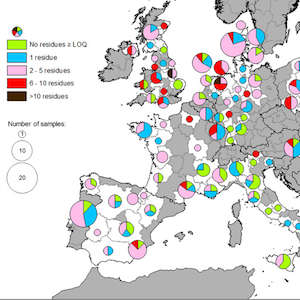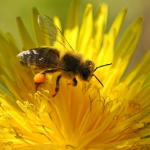Continue readingMediterranean Diet: reporting from a recent study
Pesticide residues found in more than 80% of European soils
Highlights
- 76 residues of pesticides were analyzed in 317 EU agricultural topsoils.
- 83% of the soils contained 1 or more residues, 58% contained mixtures.
- 166 different mixtures were identified.
- Predicted concentrations of individual residues were occasionally exceeded.
- The combined effects of residue mixtures need to be assessed.
Abstract
Pesticide use is a major foundation of the agricultural intensification observed over the last few decades. As a result, soil contamination by pesticide residueshas become an issue of increasing concern due to some pesticides’ high soil persistence and toxicity to non-target species. In this study, the distribution of 76 pesticide residues was evaluated in 317 agricultural topsoil samples from across the European Union. The soils were collected in 2015 and originated from 11 EU Member States and 6 main cropping systems. Over 80% of the tested soils contained pesticide residues (25% of samples had 1 residue, 58% of samples had mixtures of two or more residues), in a total of 166 different pesticide combinations. Glyphosate and its metabolite AMPA, DDTs (DDT and its metabolites) and the broad-spectrum fungicides boscalid, epoxiconazole and tebuconazole were the compounds most frequently found in soil samples and the compounds found at the highest concentrations. These compounds occasionally exceeded their predicted environmental concentrations in soil but were below the respective toxic endpoints for standard in-soil organisms. Maximum individual pesticide content assessed in a soil sample was 2.05 mg kg−1 while maximum total pesticide content was 2.87 mg kg−1. This study reveals that the presence of mixtures of pesticide residues in soils are the rule rather than the exception, indicating that environmental risk assessment procedures should be adapted accordingly to minimize related risks to soil life and beyond. This information can be used to implement monitoring programs for pesticide residues in soil and to trigger toxicity assessments of mixtures of pesticide residues on a wider range of soil species in order to perform more comprehensive and accurate risk assessments.
For further information……click on full article link.
Credit: Science Direct
Full article: https://www.sciencedirect.com/science/article/pii/S0048969718343420
Pesticides harming bees and could affect food production
Bees are pollinators but they risk global extinction due to pesticides and other factors, which would have serious implications for food production and ecosystem health.
In Summary
- In recent years, bees have been mysteriously dying off from “colony collapse disorder.”
- It has been blamed partly on pesticides as well as mites, viruses, and fungi.
- The United Nations has warned that 40 percent of the planet’s insect pollinators, particularly bees and butterflies, risk global extinction.
- This would have serious implications for food production and ecosystem health.
A new study that allowed humans to spy on bumblebees inside their nests showed that pesticides can impair social behaviour, making it hard for bees to eat and rear their young, researchers said Thursday.
Previous research has shown that the common class of pesticides known as neonicotinoids can harm bees’ ability to forage outside the nest.
The latest findings add to long-standing concerns about these important pollinators’ health, which could affect food production.
Researchers tracked the changes in bees’ behaviour by placing cameras inside 12 specially made boxes that contained one chamber for a nest and another chamber for foraging.
Some bees were exposed to concentrations of the neonicotinoid imidacloprid similar to that expected in the environment. Others were not.
They found the pesticide-exposed bees were less social in a variety of ways than control bees placed in similar boxes but not fed nectar that contained neonicotinoids.
Read more ……click on full article link.
Credit: Daily Nation
Full article: https://www.nation.co.ke/lifestyle/health/Pesticides-harming-bees/1954202-4843802-92336t/index.html



